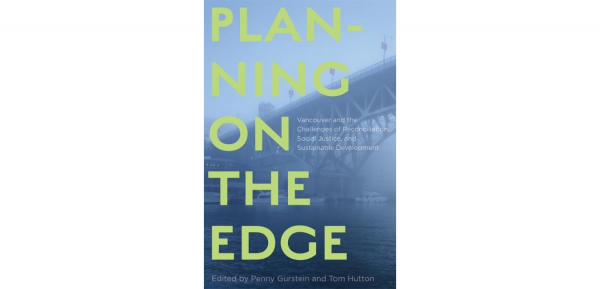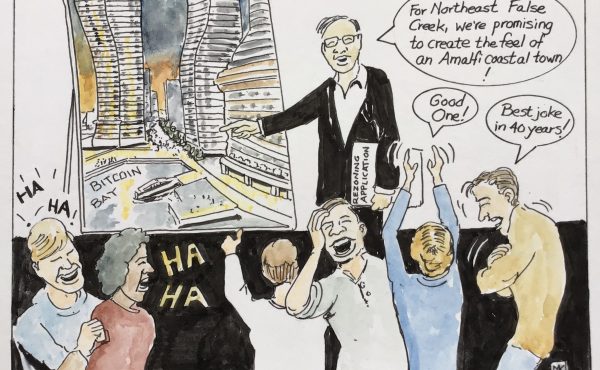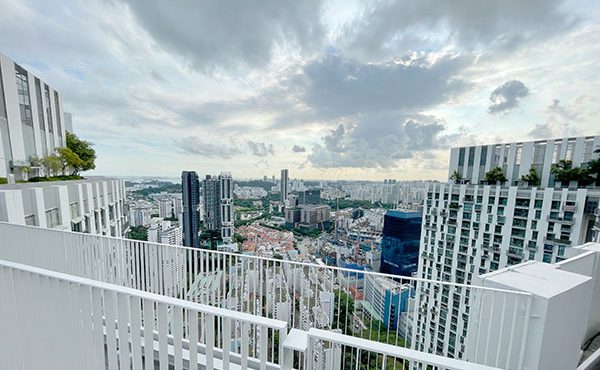
Editors: Penny Gurstein and Tom Hutton (UBC Press, 2019)
Planning On The Edge: Vancouver and the Challenges of Reconciliation, Social Justice, and Sustainable Development looks at the social inequality behind the rhetoric of “Vancouverism” and our reputation as a sustainable city. It explores the potential to (re?)develop Vancouver and its region into a place that is economically sustainable, socially just, and addresses the need for reconciliation with its Indigenous populations.
The “edge” in the title is neither reflective of Vancouver’s location on the western edge of North America, nor the city’s reputation for cutting edge urbanism, popularly known as Vancouverism. Rather it refers to the state of metro Vancouver’s development as teetering on the edge of visions of sustainable, equitable urban regionalism on one side, and unsustainable social inequalities on the other.
According to the editors of the book, UBC School of Community and Regional Planning (SCARP) professors Penny Gurstein and Tom Hutton, the purpose of the book is to “offer a constructively critical and balanced perspective on Vancouver’s development record, with an emphasis on aspects of growth and change since the 1980s.”
The editors succeed in this mission, compiling an insightful and well-researched collection of articles that provide a holistic perspective on Vancouver’s development history and planning record, and prospects for a sustainable and equitable future. Contributors include a collection of Vancouver-based Indigenous leaders, academic researchers, and policy practitioners.
The book opens with a prologue by the late John Friedmann, to whom the book is dedicated. In this opening essay, Dr. Friedman sets the context for the rest of the book, by situating the Vancouver metropolitan area both in time and place. He looks at current and future demographics, economic and governance trends, and lays out some of the challenges the region will face as it continues to evolve.
Planning on the Edge contains eleven essays organized into three parts covering a variety of topics from Indigenous planning history to environmental sustainability and social justice, as well as the perennial Vancouver topics of housing and transportation.
- Part 1 – Situating Vancouver in Space and Time, includes two essays highlighting the Musqueam history of the region and a settler scholar perspective on Vancouver’s more recent urban pasts.
- Part 2 – Sustainability and Resilience in Metro Vancouver’s Urban Systems, contains five essays investigating Vancouver’s claim as a sustainable city, including transportation infrastructures, water management, and urban design and governance.
- Part 3 – A People-Centred Approach to Planning and Development in Vancouver, comprises four essays examining some of the high profile policy “conundrums” facing the city and region including policy and social justice in (and beyond) the Downtown Eastside, housing affordability, and immigration and social integration.
The book concludes with an epilogue by Leonie Sandercock, an Indigenous Community Planning professor with UBC SCARP. In this hopeful essay, Dr. Sandercock highlights how non-Indigenous urban planners need to learn from Indigenous leaders about how best to decolonize not only Vancouver but the rest of Canada more generally. By looking at our colonial history, our current efforts at reconciliation, and our hopes for a decolonized future, she concludes the book with a tangible vision for the region based not on unfettered development and concentrated profit, but on social equity and environmental sustainability.
While the book has an academic orientation, it has lessons for students and practitioners alike. The book not only highlights the challenges Vancouver and its region face but also offers insightful case studies and strategies to guide the region’s future in a socially equitable and environmentally resilient direction.
However, the value of the book isn’t limited to a single place. As Vancouver is experiencing similar challenges to other cities across Canada, and around the world—including foreign capital, economic shifts, Indigenous rights, political polarization and environmental degradation—the book will be a useful resource to academics and practitioners tackling these seemingly intractable urban issues in any city or region.
***
For those interested the specific essays within Planning on the Edge, below is the full contents including article authors:
Contents
Prologue: Twenty-One Suburbs in Search of a City: A View of the Vancouver Metropolitan Area / John Friedmann
Introduction / Tom Hutton and Penny Gurstein
Part 1: Situating Vancouver in Space and Time
1 Planning since Time Immemorial: Musqueam Perspectives / Howard Grant, Leona Sparrow, Larissa Grant, and Jemma Scoble
2 City on the Edge: Vancouver and Circuits of Capital, Control, and Culture / Tom Hutton
Part 2: Sustainability and Resilience in Metro Vancouver’s Urban Systems
3 Vancouver’s Sustainability Gap and Lessons from the Southeast False Creek Model Sustainable Community / Jennie Moore, Cornelia Sussmann, and William E. Rees
4 Vancouverism and Sustainable Urban Design: Past Its Prime and Needing to Evolve / Maged Senbel and Mark Stevens
5 Transportation: Vancouver the City and Vancouver the Region / Lawrence D. Frank and Alexander Y. Bigazzi
6 Dynamics and Governance of Risk in Metro Vancouver / Stephanie E. Chang, Timothy L. McDaniels, Lily Yumagulova, and Mark Stevens
7 The Sustainability Gap for Water Management in the Vancouver Region / Jordi Honey-Rosés
Part 3: A People-Centred Approach to Planning and Development in Vancouver
8 Beyond the Downtown Eastside: A Regional Perspective on Affordability, Displacement, and Social Justice / Nathan J. Edelson, Penny Gurstein, Karla Kloepper, and Jeremy T. Stone
9 Beyond the Dreams of Avarice? The Past, Present, and Future of Housing in Vancouver’s Planning Legacy / Penny Gurstein and Andy Yan
10 Canada’s Cosmopolis on the Coast: How Immigration Has Shaped and Reshaped Vancouver / Lisi Feng and Michael Leaf
11 Building Civic Capacity in the Shadow of Neoliberalism: Patterns and Challenges in Metro Vancouver’s Immigrant Social Integration / Leonora C. Angeles and Olga Shcherbyna
Epilogue: Beyond Cosmopolis: Dreaming Coexistence as Indigenous Justice / Leonie Sandercock
Index
**
For more information on Planning on the Edge, visit UBC Press.
*
Yuri Artibise is an Associate Editor of Spacing Vancouver. He is also an experienced public policy advisor and digital engagement specialist with a passion for urban planning and community participation. He is the Executive Director of the Vancouver City Planning Commission, the principle of Yurbanism, an urban engagement and communications consultancy, and an elected director of the Co-operative Housing Federation of British Columbia.




